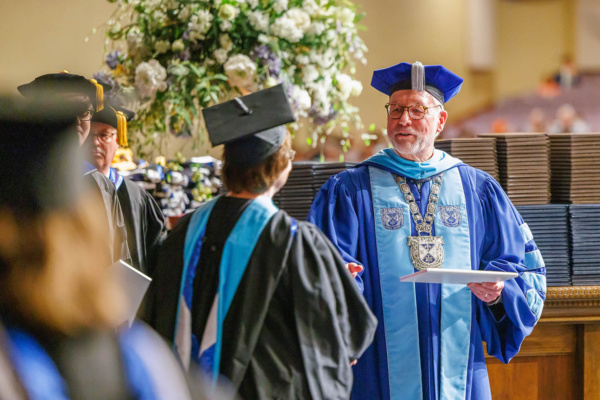Krystal Allweil: Hi, everyone. We’re talking about the Divine Design chapel series, and, Dr. Horn, this week in your chapel message, you mentioned several women who have roles of leadership, and sometimes it seems they have roles of leadership—spiritual leadership—over men. Women such as Deborah who had spiritual guidance of Barak, Huldah whose spiritual wisdom to Hilkiah the priest and other men, Anna’s proclamation in the temple to men and women about the Messiah, the 1 Corinthians 11 women who prophesied and prayed in public, and also Priscilla’s instruction of Apollos with Aquila. So how do these examples mesh with the idea that women are not to hold positions of spiritual leadership?
Sam Horn: Well, Krystal, that’s a really good question, and whoever asked that question had a lot of insight because what you described a moment ago as you talked about all these women in the Bible who occupied positions where the Lord gave them spiritual ministry to men and with men and among men certainly would raise the question in any thinking person’s mind. So why is this one office that Paul talks about in the New Testament restricted to biblically qualified men? I think that’s a fair and valid question.
And so, I want to go back briefly, and I just want to go back over some of the women that you mentioned and look at the Scriptures and see how the Scriptures actually present their ministry.
So, let’s begin with one you didn’t mention. Miriam was the sister of Moses. And she is described in the Scriptures as a prophetess, and she certainly did lead the people of God in participation in worship in a setting in Exodus chapter 15. But that setting is very interesting because when you actually go to how it’s described, it follows Moses standing before the people of God and leading the people in a song, a psalm that God had given to him to commemorate and to celebrate and really to teach the people about the identity of the God who had just delivered them from the Egyptians. And now they are crossing the Red Sea, as it were with the mud of the bottom of that ocean still on their sandals, and Moses stands before them and says, I want you to know about the God who just delivered you. And after he leads the people in this psalm that God gave to him, Moses turns to Miriam, and Miriam leads the women of Israel out and celebrates what Moses has just delivered to them authoritatively.
You mentioned Huldah the prophetess. One of the more interesting accounts in Scripture where even the priests are coming to Huldah to get information, and there’s certainly a clear reference in the Scripture multiple times of men and women receiving prophesies from the Lord.
And Joel talks about the fact that there is coming a day when God will pour His Spirit out and will allow women, even the handmaidens, to receive during dreams and prophecies, and we see this in the life of Huldah. We see this in Anna the prophetess there at the temple. We see this, for example, in Philip the Evangelist’s four daughters who prophesied. And then of course Paul talks about women being able to pray and to prophesy in the Church with their head covered.
So, the Scriptures are very, very clear in the permission of women to participate in prophecy. What is interesting about the way that is unfolded in the Scriptures is that when that prophecy involves authoritative binding revelation from God that is inspired and that is going to be the inspired revelation that God is going to use to govern all of His people, the writing prophets were all men. And certainly in the New Testament, the authors of Scripture who functioned in that way, who received the authoritative revelation from God that would set the doctrine, the teaching of the Church—they were also all men. And so, it seems to me that even within the office or the practice rather of prophecy there is this distinction.
The hardest one that you brought up is the one that I think all of us sort of have to wrestle with, and that is the role of Deborah the judge in Judges chapter 4 and 5. And there’s no question—although it’s debated—there seems to be on a surface reading of the text no question that Deborah did function as a judge over Israel in the same way that the other judges that we read about in the book of Judges. However, even in the text itself as the text sort of shapes the contours of Deborah’s ministry, there are indications in the text that this is not as God would have intended it. For example, in the introduction of Deborah to the people of God, the writer of Judges wants you to know that she is a wife and a mother in Israel. And that is stressed in the text, and then even in her ministry of delivering people—because that’s actually what a judge in and the book of Judges did, they were a deliverer of the people. But in her delivery of the nation of Israel against the Canaanites and the enemy Jabin, she comes to the military leader, the recognized leader of the people, Barak, and she challenges him to gather the army together and to go. In other words, she’s not taking that position. She comes to Barak and exhorts him to take his position and in a moment that the writer of Judges sort of puts it before you as a shameful thing. Barak looks at Deborah and says, I won’t do it unless you go with me. And so, she goes with him. But it’s very clear that he musters the army, and then she says to him, almost as a rebuke now, because of this God is going to actually deliver the enemy into your hand by the hand of a woman. And that’s exactly what happens.
By the time you get to the New Testament, and you start looking at the teaching office of the Church of God that would have spiritual authority to hold people accountable to the revealed Word of God, that does seem by the Apostle Paul very clearly to be restricted to the biblically qualified men who have been called by God to that task.
Allweil: We had one other question come in. If male priesthood in the Old Testament is part of our understanding of the role for men in the Church today, then how do we discuss the priesthood of every believer today? Are we dealing with two different types of priesthood?
Horn: Okay, that is a—oh, that’s a—that brings another great question. In fact, as you were—as I was kind of looking at these beforehand I thought, Man, these are really good questions. So, whoever sent these questions, thank you.
And that’s another area that I’ve looked at trying to wrestle through in my own mind and in my own heart about the priesthood. Because there’s very clearly references in the Old Testament that the priesthood of Israel as a nation was limited to a tribe, and even within that tribe, it was limited to men, and then even among those men they had to meet certain qualifications.
But it’s very interesting to me that in the book of Exodus God describes the nation of Israel as a kingdom of priests. So, in a sense every Israelite was a priest before God. This was a kingdom made up of priests, but within that kingdom of priests, there was a priestly tribe that had been set apart by God—the tribe of Levi. And within that tribe, there were men who were biblically and spiritually qualified to the office of priests. And even among the priests, there was the restriction that was placed upon the high priest. So, in the New Testament it’s not surprising that Peter would say that we are like Old Testament Israel, a kingdom of priests.
That the individual priesthood of every believer is true, and that every believer has direct access to God and direct ability to pray to God and to speak about God. But like ancient Israel, within the Church of God, this new kingdom of priests, there is an office, the office of pastor/teacher/elder, that has been set up by God to minister the Word of God—that was what the priest in the Old Testament did. The teaching office of Israel was the priest, the priesthood. And the teaching office of the Church is the pastor/teacher/elder. And like the priesthood, the Levitical priesthood in the Old Testament, this office has also been restricted to biblically qualified men.
Allweil: Thank you, Dr. Horn, for answering these questions this week. And thank you, everyone, for watching. We’ll see you next week.
Horn: Thank you.
Read the study notes and watch the chapel message HERE.







